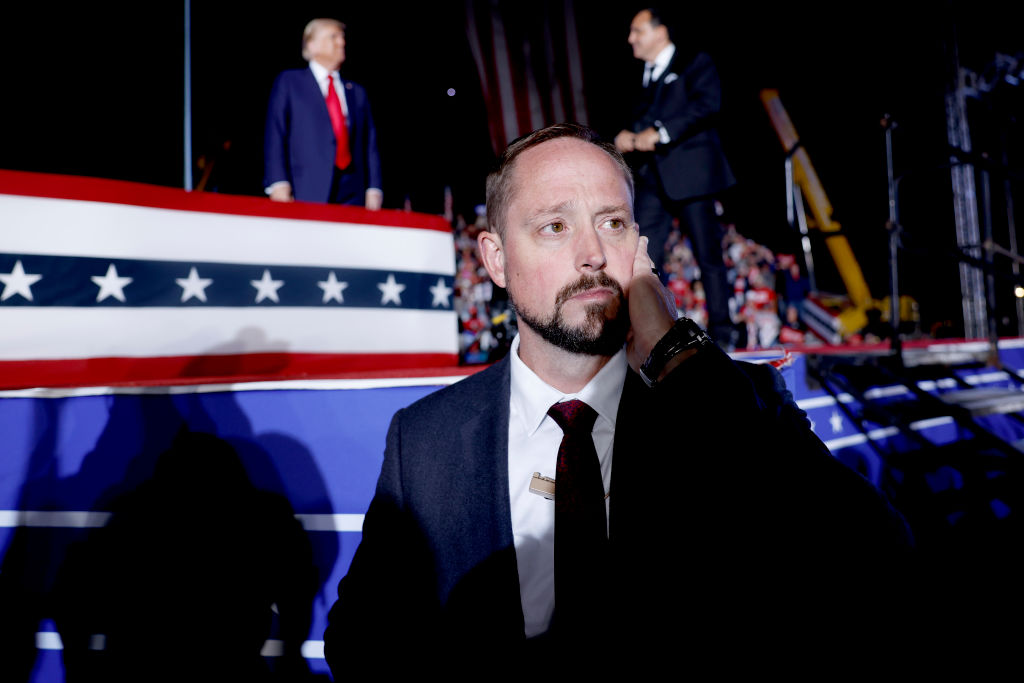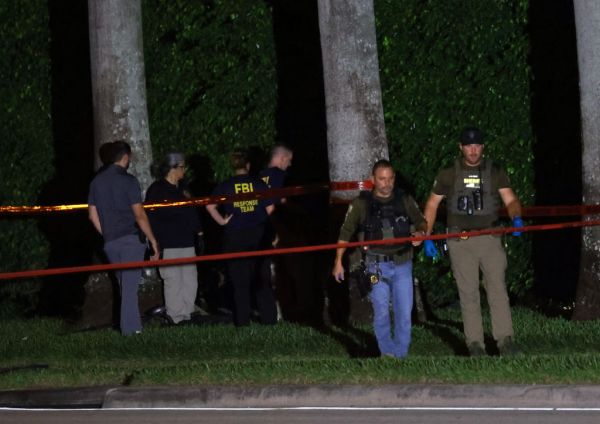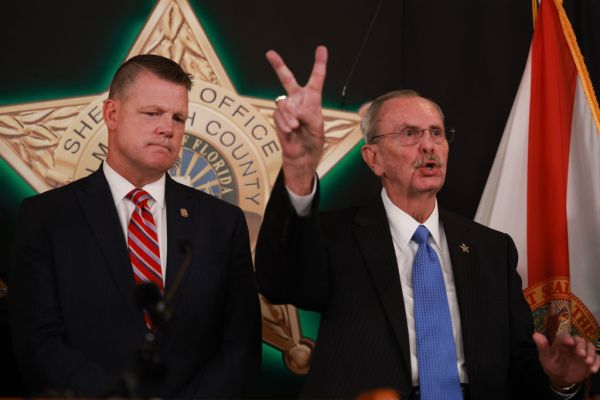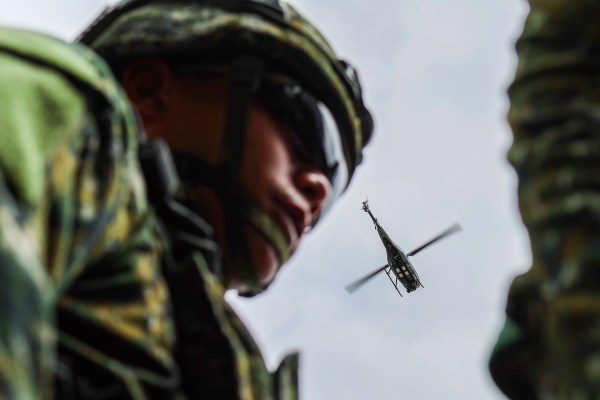Happy Monday! Our social media feeds have recently been overwhelmed with bizarre, artificial intelligence-generated images of former President Donald Trump performing feats of strength or heroism.
And though the pictures from his trip to a McDonald’s in Pennsylvania—where he manned the fryers and the drive-thru window over the weekend—look AI-generated, we can assure you: They’re real.
Quick Hits: Today’s Top Stories
- A Moldovan referendum held Sunday on whether to join the European Union was too close to call as of Monday morning local time. With nearly all of the ballots counted, 50.09 percent of voters voted in favor of an amendment that would enshrine the eastern European country’s path to joining the EU in its constitution. The measure has been championed by the country’s president, Maia Sandu, who favors Western integration as a bulwark against Russian influence. Sandu was also on the ballot yesterday and won the first round of voting in the presidential election, which will now head to a runoff. In the lead-up to and aftermath of Sunday’s vote, Sandu warned of “clear evidence” of foreign and criminal interference, including vote buying and “fraud of unprecedented scale.” The months that preceded the referendum featured a slew of Russian-backed cyberattacks and misinformation and influence operations targeting the election.
- The Ukrainian military said Sunday it had struck one of Russia’s largest military explosives factories on Saturday night, as well as a military airfield. The Sverdlov plant—in the western city of Dzerzhinsk, hundreds of miles from the Ukrainian border with Russia—was targeted by long-range Ukrainian drones, and Ukrainian officials said Sunday they were still assessing the extent of the damage. Meanwhile, Russian missile attacks injured more than a dozen people in Kryvyi Rih, a city in central Ukraine, on Sunday. The strikes came after the two countries executed a prisoner swap on Friday, with both sides releasing 95 prisoners in a deal brokered by the United Arab Emirates.
- Two top-secret U.S. intelligence documents that contained information about Israel’s plans to strike Iran in retaliation for its October 1 missile attack reportedly appeared on Friday on the messaging platform Telegram. The documents—generated by the U.S. National Geospatial-Intelligence Agency—contained intelligence on the aircraft and weapons the Israel Defense Forces (IDF) are expected to use against Iran, but they did not include any anticipated targets. Markings on the documents indicated they were available to the “Five Eyes”—an intelligence-sharing alliance between the U.S., the United Kingdom, New Zealand, Canada, and Australia. American officials are investigating the source of the leak, which first surfaced on a pro-Iran channel.
- German law enforcement officials arrested a suspected terrorist on Saturday who was allegedly planning an attack on the Israeli embassy in Berlin. Prosecutors said the detained individual was a Libyan citizen who had ties to the Islamic State and allegedly messaged with a member of the terrorist group about plans to attack the embassy. Israel’s ambassador to Germany, Ron Prosor, thanked law enforcement in a statement on Saturday, adding, “This is yet another example of Israeli embassies being on the front line of the diplomatic battlefield.”
- The IDF carried out a wave of airstrikes targeting Hezbollah across Lebanon over the weekend, including in the capital Beirut. Israeli officials said their strikes on Sunday targeted the financial arm of the terrorist group responsible for paying the salaries of Hezbollah fighters. On Saturday, Defense Secretary Lloyd Austin called on the Israeli military to “scale back” its strikes on Beirut, arguing the civilian toll of Israel’s attacks against Hezbollah in Lebanon was “far too high”—though he also faulted Hezbollah for embedding within the civilian population. The terrorist group fired hundreds of rockets and drones at Israel over the weekend, including an explosive drone that targeted Israeli Prime Minister Benjamin Netanyahu’s private residence in Caesarea on Saturday. Neither Netanyahu nor his wife were home, and there were no reported injuries from the attack.
- The Hamas-run Gaza Health Ministry claimed Israeli airstrikes in northern Gaza killed dozens of people on Saturday night and Sunday, leading to condemnations from United Nations officials. The health ministry said at least 87 people were killed and more than 40 injured, though the body does not distinguish between civilians and terrorist combatants in its casualty counts. Israeli officials said they were assessing reported casualties but described the initial reported numbers as exaggerated.
- Cuba suffered a nationwide blackout after a major power plan failed on Friday, leaving nearly all of the island’s 10 million residents without power. Much of Havana remained without power on Sunday as authorities struggled to get the grid fully back online. While Cuba’s electrical grid has long had issues, the outages were some of the worst the country has seen in years.
- Seven people died—and six more were critically injured—after a ferry dock partially collapsed Saturday on Georgia’s Sapelo Island. Hundreds of people gathered on the small island over the weekend for a fall celebration of the local Gullah-Geechee community of slave descendants. Local authorities said that at least 20 people went into the water when a gangway collapsed.
- The 2024 World Series matchup is set. The New York Yankees and Los Angeles Dodgers will face off in the best-of-seven series for the 12th time in the teams’ respective history—and first since 1981—after the Dodgers defeated the New York Mets 10-5 on Sunday night. The series will kick off on Friday night in Los Angeles.
- The New York Liberty secured their first WNBA championship on Sunday night, defeating the Minnesota Lynx 67-62 in overtime. Liberty forward Jonquel Jones was named MVP of the series.
‘Bureaucratic, Complacent, and Static’

As the bipartisan, four-person panel appointed in the aftermath of the July 13 attempt on former President Donald Trump’s life was in the process of investigating Secret Service failures that led to that near-miss at Trump’s rally in Butler, Pennsylvania, there was another attempted assassination.
Just over two months after the first assassination attempt against the former president—when Thomas Matthew Crooks fired shots from a nearby roof at the rally in Pennsylvania—Ryan Wesley Routh spent hours lying in wait with a gun at the perimeter of Trump’s West Palm Beach golf course one Sunday in mid-September before he was spotted by a Secret Service agent who fired at him from the course.
Did it matter to the panel? “The Independent Review Panel is of the view that the facts of the second attempt are such that they do not affect the findings and recommendations presented within this report,” the authors wrote in the report released late last week—“other than to the extent that they may reinforce them.”
The 51-page report released Thursday paints a damning picture of the failures before and during the Butler shooting: issues that “reveal deep flaws in the Secret Service, including some that appear to be systemic or cultural.” The panel recommended that the agency—which has a dual mandate to protect dignitaries and investigate currency and financial crime—clean house of senior leadership and refocus its priorities on the protection portion of the mandate.
As the report details, Crooks—who was 20 years old—was known to law enforcement as a suspicious person some 90 minutes before he began shooting from a nearby roof just after 6 p.m. ET on July 13. The Secret Service knew of his suspicious behavior some 25 minutes before he opened fire, wounding the former president and several members of the audience and killing one rallygoer. By 6:15 p.m., the shooter was dead, and Trump had been whisked away by his Secret Service detail.
The agency’s director at the time, Kimberly Cheatle, resigned ten days after the shooting following contentious testimony before the House Oversight Committee. Her obfuscations during the hourslong grilling led to bipartisan calls for her to step down. The shooting, she had said, was the Secret Service’s “most significant operational failure” in decades—though it was by no means the first controversy for an agency awash in unforced errors in recent years.
On July 14, President Joe Biden directed the Department of Homeland Security to create a panel to investigate the Secret Service procedures and policies that might have contributed to the security failure; the House of Representatives and Senate are likewise investigating the failures of the day. A preliminary report from the Senate investigation concluded that the Butler attempt was both “foreseeable” and “preventable.”
The bipartisan executive panel was composed of four former law enforcement and homeland security officials: Mark Filip, former President George W. Bush’s deputy attorney general; David Mitchell, the chief of police and director of public safety at the University of Maryland with a background in Maryland law enforcement; former Secretary of Homeland Security and two-term Arizona Gov. Janet Napolitano; and Frances Fragos Townsend, a deputy national security adviser to George W. Bush.
And the four didn’t mince words. “The Secret Service has become bureaucratic, complacent, and static even though risks have multiplied and technology has evolved,” the panelists wrote in a letter to Secretary of Homeland Security Alejandro Mayorkas, in whose department the Secret Service is housed. “The work of the Independent Review Panel uncovered not only numerous mistakes that led to the events of July 13 in Butler, Pennsylvania, but also deeper, systemic issues that must be addressed with urgency.”
The report details serious communications lapses—both between local law enforcement and the Secret Service and with the former president’s detail, which hadn’t been told about Crooks before Trump took the stage in Butler that evening. Even when details about Crooks were communicated between local law enforcement and the Secret Service, however, the communications never triggered any law enforcement to approach the gunman. The report points to a general lack of “cohesion” in the planning process across local and state law enforcement and the Secret Service.
That was also evidence of “a troubling lack of critical thinking” from members of the Secret Service before, during, and after the events of July 13. The fact that Secret Service agents never approached Crooks, despite what the panel describes as “escalatory” information about his behavior, was concerning—and perhaps also an indication, the panel wrote, of a cultural problem at the agency that prevented agents from speaking up.
“Particularly when you look at Butler, I scratch my head and say, ‘Okay, human error does occur,’ but there were just so many mistakes there,” said Anthony Cangelosi, a lecturer at the John Jay College of Criminal Justice at the City University of New York and a former Secret Service agent based in the New York field office. “This wasn’t just one or two.”
“But I also don’t like to reach broad conclusions,” he added. “Could it have been just that particular field office, the assigned agents, and then the leadership in that field office? So that’s a question I have.”
The fundamental error that day seems to be that the warehouse from which Crooks fired hadn’t been secured. It’s particularly worrying given the fact that, while Crooks seems to have been acting alone, there was intelligence—of which the Secret Service was aware—“regarding a long range threat by a foreign state actor against former President Trump,” the report said. The failure to secure the warehouse was, therefore, “particularly glaring and demonstrates a disconnect between intelligence and planning: the rally site security plan orchestrated by the Secret Service was insufficiently responsive to a threat potential that had been briefed.”
The panel identified larger institutional challenges, too, including concern about an “informal mantra” at the agency encouraging agents to “do more with less”—a mindset that ultimately translated into efforts to “minimize” the resources expended in Butler and generally, even at the risk of the protective mission.
That “do more with less” attitude was on display even in the aftermath of the second attempt on Trump’s life in September. “The Secret Service operates under a paradox of zero fail mission but also that we have done more with less for decades,” Acting Director Ronald Rowe said during a press conference. “And this goes back many, many decades.”
The agency is indeed understaffed and suffers serious attrition that is only exacerbated by the strain on current agents working long hours under often punishing conditions. “It’s a huge burden to stand on one’s feet for 10 hours straight, sometimes with minimal breaks,” Cangelosi told TMD. “They really need to Congress up, so to speak, and realize that there’s an attrition problem for a reason. You’re not asking people to bite it for six months. You’re asking them to bite it for 10, 12, 15 years.”
And indeed, Congress provided the agency with additional funds to the tune of $231 million in its stop-gap funding bill that expires on December 20. “We are running our people at levels that we have not seen in our protective operations,” Rowe told the Washington Post last month. “We are burning everything hot right now.”
But the report pushes back on the idea that money alone would solve the problem. “The failure of July 13 likely would have occurred regardless of budget levels at the current Secret Service,” the investigators wrote. “Put otherwise, even an unlimited budget would not, by itself, remediate many of the causes of the failures on July 13.”
The panel recommended tactical changes on protective missions, including streamlining communications between all the law enforcement actors involved, mandating an in-person meeting between the dignitary’s detail and the agent in charge of the site when the protectee arrives at the site, and requiring overhead surveillance—drones—at all outdoor events with former presidents, candidates, and nominees. The investigators also recommended a more robust training program for agents.
But perhaps the foursome’s most scathing conclusions and radical solutions had to do with the institution’s leadership and, indeed, its basic raison d’etre. “The Panel expresses extreme skepticism that many of the Service’s non-protective (investigative) missions meaningfully contribute to the Service’s protective capability and is concerned that they may materially distract from it,” the investigators wrote. “To the extent that any investigative priorities remain within the Secret Service’s portfolio of responsibilities, they must be directly supportive of and subordinate to the overriding protective mission.”
That’s a fundamental shift for an agency whose original mission was to investigate counterfeit crimes and whose agents, for the most part, wear both hats, shifting between protective duty and investigations. “We will fully consider the Panel’s recommendations and are taking the actions needed to advance the Secret Service’s protection mission,” Mayorkas, the Homeland Security secretary, said in a statement responding to the panel’s findings.
Among those recommendations is that the agency cleans house, booting senior leadership that could be complicit in a “culture” problem in the Secret Service. The panel argued in favor of putting in place new senior leadership from outside the agency. “Although experience within the Service is laudable and important, and some members of a future leadership team will likely be Secret Service veterans, the events of Butler suggest that there is an urgent need for fresh thinking informed by external experience and perspective,” they wrote.
In the meantime, the agents of the Secret Service are under a white-hot spotlight—one the panel didn’t back away from, even if it damages morale at the agency. “Bravery and selflessness alone, no matter how honorable,” the investigators wrote, “are insufficient to discharge the Secret Service’s no-fail protective mission.”
Worth Your Time
- In its new special report on the American economy, The Economist was bullish. “One thing has been consistent since the early 1990s: America has grown faster than other big rich countries, and it has rebounded more strongly from bumps along the way,” the report reads. Compared to the rest of the developed world, the American economy is in surprisingly good shape, and is now actually accelerating away from its peers: “In 1990 America accounted for about two-fifths of the overall GDP of the G7 group of advanced countries; today it is up to about half. On a per-person basis, American economic output is now about 40% higher than in western Europe and Canada, and 60% higher than in Japan—roughly twice as large as the gaps between them in 1990. Average wages in America’s poorest state, Mississippi, are higher than the averages in Britain, Canada and Germany.”
- Writing for the New York Times, Mattie Kahn profiled one of the hottest print magazines in the country: Costco Connection. “The media business might be in free fall, but in Issaquah, Wash., the merriest band of magazine makers in America drives to Costco headquarters and sets about producing a monthly print periodical that is delivered to more households across the United States than Better Homes & Gardens, The New Yorker, and The Atlantic combined,” Kahn wrote. “And it’s growing. … Its reach is so vast that Costco Connection is now the nation’s third largest magazine by print circulation, behind AARP: The Magazine and The AARP Bulletin. You, perhaps, had no idea. But Oprah did. Ms. Winfrey has no shortage of press opportunities, but she has made time for Costco Connection. So have Tom Hanks and Bruce Springsteen, recognizing there are few more enviable placements for a person with something to sell than the cover of a publication linked to a store where nearly one-third of U.S. consumers shop.”
Presented Without Comment
Wall Street Journal: Elon Musk Offers $1 Million Daily Prize for Signing His Petition
Also Presented Without Comment
CBS News: Trump Makes Vulgar Comments About Arnold Palmer At Pennsylvania Rally
“This is a guy that was all man,” the former president said. “This man was strong and tough, and I refuse to say it, but when he took showers with the other pros, they came out of there, they said, ‘Oh my God, that’s unbelievable.’”
To laughter, Trump added, “I had to say it.”
In the Zeitgeist
The Georgia Bulldogs defeated the top-ranked Texas Longhorns on Saturday night, but not before Texas fans got a pass interference call reversed by raining down trash from the bleachers into the end zone.
“They’re not going to win the Taco Bell [Student Section of the Year] contest at this rate,” one ABC broadcaster observed.
Toeing the Company Line
- In the newsletters: The Dispatch Politics crew reported on Bill Clinton’s cheerleading for the Harris campaign, Nick explored (🔒) Trump’s increasingly unstable behavior on the campaign trail, Jonah criticized straight-line predictions about the future of China, Stirewalt outlined (🔒) the key House races to keep an eye on, and Daniel Darling argued in Dispatch Faith that politically engaged Christians are good for our politics.
- On the podcasts: Jonah ruminated on the best-case and worst-case scenarios for Harris and Trump presidencies on the weekend Remnant, and on today’s Dispatch Podcast, Jamie is joined by David Frum of The Atlantic to discuss the conservative case for Harris.
- On the site over the weekend: Cliff Smith revisited The Shawshank Redemption 30 years after it flopped at the box office and Christopher Scalia reviewed Saturday Night, a new movie about “America’s favorite consistently disappointing TV show.”
- On the site: Katherine Dee previews our very online political future in this week’s Monday Essay, while Jonathan Schanzer and Natalie Ecanow argue that the U.S. needs to put pressure on Qatar in the wake of Yahya Sinwar’s death.
Let Us Know
Is it better to bring in a leader from the outside who doesn’t have experience in the Secret Service or a leader who has experience in the agency?








Please note that we at The Dispatch hold ourselves, our work, and our commenters to a higher standard than other places on the internet. We welcome comments that foster genuine debate or discussion—including comments critical of us or our work—but responses that include ad hominem attacks on fellow Dispatch members or are intended to stoke fear and anger may be moderated.
With your membership, you only have the ability to comment on The Morning Dispatch articles. Consider upgrading to join the conversation everywhere.